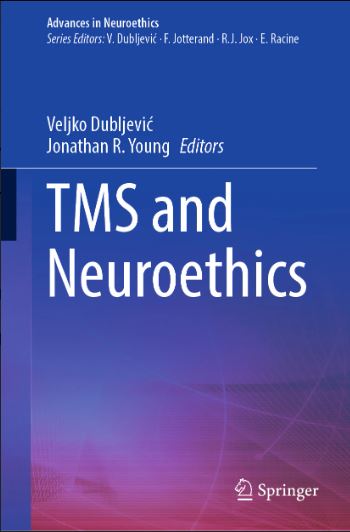Springer Cham
TMS and Neuroethics
TMS and Neuroethics
Couldn't load pickup availability
FREE SHIPPING
Edited By Veljko Dubljević, Jonathan R. Young
ISBN13: 9783031924002
Published: July 2025
Format: Hardback
Pages: 265. 1 b/w illustrations, 3 illustrations in colour
Publisher: Springer Cham
Description:
As transcranial magnetic stimulation (TMS) continues to expand from a tool of neuroscience research into a growing array of clinical applications, it presents a number of open questions that both invite and complicate ethical evaluation. Empirically supported concerns remain regarding interactions between TMS and psychiatric medications or other interventions, the potential for adverse effects in stimulated brain regions, and whether modulation of brain activity—particularly via changes in oscillatory states—might affect aspects of personhood.
This volume explores the ethical landscape surrounding TMS in both research and clinical settings. Prior neuroethics literature has largely focused on theoretical implications of neurostimulation technologies, including conceptual clarification (e.g., invasiveness) and normative questions regarding the alignment of these technologies with societal values. However, while some empirical work has captured perspectives from TMS patients, many key voices—such as those of family members, clinicians, and underrepresented communities—have remained absent from scholarly discussions.
Spanning historical reflection, theoretical debate, empirical analysis, and clinical insight, this collection features contributions from scholars and practitioners working at the intersection of neuroethics, neuroscience, psychiatry, and biomedical engineering. Part I of the volume offers historical and theoretical reflections, including the origins and growth of TMS research, racial disparities in access and participation, caregiver perspectives, and emerging issues related to cognitive enhancement, non-clinical use, and applications in social neuroscience and creativity. Part II turns to new directions and ethical issues in clinical TMS research, addressing treatment subgrouping, adolescent and geriatric use, mood and substance use disorders, suicidality, and the evolving regulatory landscape.
Together, these chapters provide an interdisciplinary examination of the ethical, clinical, and societal dimensions of TMS. Whether as an introduction to the neuroethics of brain stimulation or as a resource for neuroscientists, clinicians, engineers, and ethicists, this volume aims to foster greater understanding and dialogue around the responsible development and application of TMS.
Table of Contents:
Part I – Historical and Theoretical Reflections
- The Origins and Growth of TMS Research – Veljko Dubljević
- Racial Disparities in TMS Access and Participation – Jonathan R. Young
- Caregiver Perspectives on Neurostimulation Ethics – M. Alvarez
- Cognitive Enhancement and Non-Clinical Use – K. Hoffman
- Creativity and Brain Modulation – R. Taylor
Part II – Ethical Issues in Clinical TMS Research
- Ethical Subgrouping in Treatment Trials – D. Gupta
- Adolescent and Geriatric TMS – L. Naito
- Mood Disorders, Addiction, and Neurostimulation – S. Patel
- TMS and Suicidality – C. Li
- Regulation and Global Standards in TMS Ethics – V. Dubljević & J.R. Young
Why Buy This Book?
This book bridges neuroscience and ethics, tackling the most pressing moral and social questions raised by transcranial magnetic stimulation (TMS). Edited by leading experts, it explores how TMS impacts cognition, identity, and clinical practice through a blend of empirical studies and philosophical debate.
Perfect for professionals and institutions navigating the intersection of brain technology, medicine, and human values.
Keywords:
TMS, neuroethics, brain stimulation, ethics, neuroscience, psychiatry, bioethics, cognitive enhancement, mental health, clinical research
Target Audience:
Neuroscientists, Psychiatrists, Ethicists, Medical Researchers, Cognitive Scientists, Clinicians, Biomedical Engineers, Psychologists, University Libraries, Ethics Committees
Genres:
Neuroscience, Ethics, Psychiatry, Medical Research, Bioengineering
📘 Learn more about shipping, delivery times, and returns, see our FAQ here


